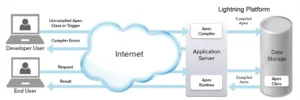In our previous blog post we had discussed about What is Apex. In these blog post we discuss about When Should I Use Apex in Salesforce
Contents
- 1 When to Consider Using Apex
- 2 Scenarios Where Apex is Necessary
- 3 Apex vs Other Coding Solutions
- 4 Best Practices for Using Apex
- 5 Common Pitfalls to Avoid
- 6 Conclusion
- 7 FAQs
When Should I Use Apex in Salesforce
What is Apex?
Apex is a strongly-typed, object-oriented programming language that allows developers to execute flow and transaction control statements on the Salesforce platform. It’s quite similar to Java and is designed specifically for the Salesforce environment, giving developers the ability to add business logic to most system events, including button clicks, related record updates, and Visualforce pages.
Why Apex is Important
Apex provides functionality that declarative tools like Process Builder or Flow Builder cannot handle. This includes the ability to perform complex calculations, create custom web services, and handle large data volumes with ease. Apex is integral for creating advanced customizations that are not possible through Salesforce’s point-and-click tools.

When to Consider Using Apex
Limitations of Declarative Tools
While Salesforce’s declarative tools are powerful, they have their limits. These tools are designed for straightforward tasks and can become cumbersome or insufficient when handling more complex requirements. When you find yourself constrained by these limitations, Apex can provide the flexibility you need.
Complex Business Logic
If your business logic requires complex decision-making processes, intricate conditional statements, or multi-step operations that involve numerous records, Apex is often the better choice. It allows for intricate customizations that declarative tools simply cannot match.
Custom Integrations
When integrating Salesforce with external systems or applications, you might need more control over the data being sent and received. Apex can be used to write custom web services or callouts that can communicate with external systems, providing a seamless integration experience.
Understanding Salesforce’s Declarative Tools
Overview of Declarative Tools
Salesforce provides various declarative tools such as Process Builder, Flow Builder, and Workflow Rules, which allow users to automate business processes without writing a single line of code. These tools are user-friendly and ideal for those with limited programming knowledge.
Use Cases for Declarative Tools
Declarative tools are perfect for simple automations like sending email alerts, updating fields, or creating tasks based on certain criteria. They are also useful for guiding users through step-by-step processes with minimal input from a developer.
Comparison Between Declarative Tools and Apex
Declarative tools excel in simplicity and ease of use but lack the depth of control and flexibility that Apex offers. When your requirements go beyond the scope of what declarative tools can handle, that’s when Apex comes into play.
Scenarios Where Apex is Necessary
Complex Data Manipulation
In situations where you need to manipulate data in ways that declarative tools can’t handle—such as processing large datasets, performing complex calculations, or creating complex data relationships—Apex is your go-to solution.
Examples of Complex Data Manipulations
Imagine you need to calculate the commission for sales reps based on a multi-tiered commission structure that varies by product category, sales volume, and region. Such complexity would be cumbersome, if not impossible, to achieve with declarative tools alone.
Batch Processing
When dealing with large volumes of data, processing everything in one go isn’t always feasible or efficient. Apex allows you to break down operations into manageable chunks, known as batch processing, which helps in maintaining performance and avoiding governor limits.
Benefits of Batch Processing with Apex
Batch processing in Apex ensures that you can handle operations on thousands of records without hitting Salesforce’s limits. This is particularly useful for data cleansing, migrating data, or mass updates.
Custom Web Services
Sometimes, your Salesforce org needs to interact with external systems in ways that pre-built integrations or tools don’t support. Apex can be used to create custom web services that allow for this kind of flexibility.
Creating Custom APIs with Apex
Apex allows developers to expose custom logic as REST or SOAP web services, enabling Salesforce to interact with other platforms or systems in real-time, making it a critical tool for businesses with complex integration needs.
Advanced Automation Needs
There are instances where declarative automation tools, like Process Builder or Flow Builder, fall short, especially when multiple objects or complex criteria are involved. Apex can handle such advanced scenarios, providing a more robust solution.
When Workflows and Process Builders Fall Short
Consider a scenario where you need to automate the creation of related records across multiple objects based on a specific trigger event. While Flow Builder might manage simple versions of this, Apex can handle the more complex variants with ease.
Performance Optimization
When working with large datasets or complex operations, performance becomes a crucial factor. Apex allows for greater optimization and efficiency, ensuring that your Salesforce org remains responsive even under heavy load.
Handling Large Datasets Efficiently
Apex’s bulk processing capabilities make it ideal for operations that involve handling large amounts of data. By using SOQL queries and DML operations efficiently, you can ensure your processes run smoothly and quickly, even with extensive data.
Apex vs Other Coding Solutions
Visualforce vs. Apex
Visualforce is a framework for building custom user interfaces in Salesforce, but when combined with Apex, it becomes far more powerful. Apex handles the business logic, while Visualforce manages the presentation, making them a dynamic duo for custom applications.
Lightning Components vs. Apex
Lightning Components provide a modern UI for Salesforce apps, but complex business logic is often better handled by Apex. Using Apex with Lightning Components allows you to create more interactive and responsive applications.
External Systems Integration
While there are other tools and languages available for integrating external systems with Salesforce, Apex remains one of the most efficient and direct methods, especially when custom or real-time integrations are required.
Best Practices for Using Apex
Writing Efficient Apex Code
Efficient Apex code is key to maintaining a healthy Salesforce environment. This includes following best practices such as bulkifying your code, reducing the number of SOQL queries within loops, and making use of Apex triggers judiciously.
Testing and Debugging in Apex
Testing is crucial in Apex development. Always write test classes that cover a wide range of scenarios to ensure your code behaves as expected. Use Salesforce’s debugging tools to troubleshoot and refine your code.
Maintaining Apex Code
Regularly review and update your Apex code to ensure it remains efficient and relevant to your business needs. This includes refactoring old code and keeping an eye on new Salesforce releases that might introduce better ways to accomplish the same tasks.
Common Pitfalls to Avoid
Overcomplicating Simple Tasks
Not every problem requires a complex solution. Sometimes, the simplest approach is the best, and overcomplicating can lead to harder-to-maintain code and increased chances of bugs.
Ignoring Governor Limits
Salesforce enforces governor limits to ensure resources are used efficiently. Ignoring these limits can lead to runtime errors, so it’s crucial to design your Apex code with these constraints in mind.
Lack of Proper Testing
Inadequate testing can result in unexpected issues once your code is live. Always ensure your Apex code is thoroughly tested in a sandbox environment before deploying it to production.
Conclusion
Apex is a powerful tool in the Salesforce ecosystem, providing the flexibility and control needed for complex customizations and integrations. While declarative tools should be your first stop for simple tasks, Apex becomes essential when your business requirements outgrow the capabilities of point-and-click solutions. By understanding when to use Apex and following best practices, you can ensure your Salesforce implementation is both robust and scalable.
We Want to More About When Should I Use Apex in Salesforce Click Here
FAQs
Can I use Apex to replace all declarative tools in Salesforce?
No, Apex should complement, not replace, declarative tools. Use declarative tools for simpler tasks and Apex for more complex scenarios.
Is it difficult to learn Apex if I’m new to coding?
While Apex is easier to learn than some other programming languages, a basic understanding of programming concepts will help. Salesforce provides ample resources to get you started.
How does Apex handle large data volumes?
Apex is designed to handle large data volumes efficiently through features like batch processing and bulkified queries, which help avoid hitting governor limits.
What are governor limits in Apex?
Governor limits are Salesforce’s way of ensuring efficient use of resources. They limit the number of operations, like SOQL queries or DML statements, that can be performed in a single transaction.
Can Apex be used in Salesforce Lightning?
Yes, Apex can be used with Salesforce Lightning, especially when building custom business logic that integrates with Lightning Components.
In our next blog post we will discuss about How Does Apex Work

2 thoughts on “When Should I Use Apex in Salesforce”